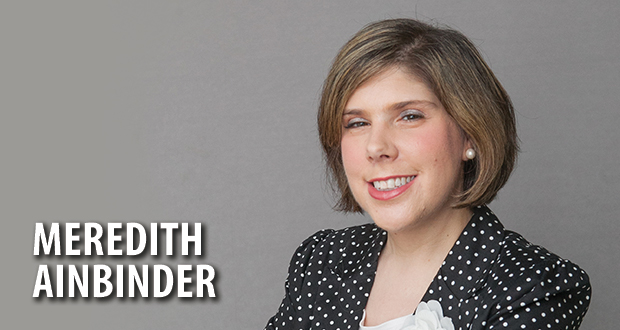 Meredith L. Ainbinder’s path to working in higher education hasn’t been a straight line, but the Boston lawyer is confident she’s ended up where she belongs. Ainbinder became deputy general counsel at Emerson College in 2016, after stints as a litigation partner at Sunstein, Kann, Murphy & Timbers and as senior litigation counsel at global lighting tech company Osram Sylvania.
Meredith L. Ainbinder’s path to working in higher education hasn’t been a straight line, but the Boston lawyer is confident she’s ended up where she belongs. Ainbinder became deputy general counsel at Emerson College in 2016, after stints as a litigation partner at Sunstein, Kann, Murphy & Timbers and as senior litigation counsel at global lighting tech company Osram Sylvania.
Though Ainbinder’s career path may have zig-zagged, her passion for innovation and creativity has been the consistent driving force, she says. Practicing intellectual property law at Sunstein, she found the essence of the work was “promoting people who are coming up with great ideas,” and her subsequent roles have presented new ways to continue that mission.
“It’s taking that same interest and funneling it through different areas of law,” she explains.
As one of just two lawyers at Emerson, Ainbinder feels deeply ingrained in the Boston school’s community and appreciates the opportunity to wear different hats in working with faculty and students.
“It’s such a generalist position that it allows me to be really sharp and constantly thinking of new things as they come in the door,” she says.
Outside the office, Ainbinder recently began a one-year term as president of the Women’s Bar Association of Massachusetts, an organization that she says has been “a rock” for her throughout her legal career.
She recently sat down with New England In-House’s Matthew Cove.
***
Q. What’s been the biggest adjustment in working in-house at a higher education institution?
A. One of the main things that’s different being in-house — and people say this all the time — is you live with your client. So the people you work with are not other lawyers for the most part, they’re around you all the time, and you don’t have these highly curated meetings that you have with clients at a law firm.
You’re with your clients every day, you see what they go through, and you understand what their questions are as they come in. It’s a big change for lawyers who go in-house to be very integrated into the fabric of the institution. But it’s also exciting because you really identify with the organization, and it becomes part of your identity in a way that it might not if it’s a client of yours.
When I was in-house in a corporate setting, it was a different kind of institution altogether, whereas being in higher ed exposes you to different areas of law. Your community is here on campus for the most part. We’re responsible for housing people and feeding them, and athletics and shows. It’s a very different group of legal issues.
Q. With those responsibilities in mind, does being in education make grappling with political and regulatory changes particularly challenging?
A. You have to really be prepared for when any new regulations come out in any field, and typically you have some warning when regulations are changing. But the most important thing is to have a clear understanding of your legal framework. You have to understand what the regulations are that are in effect, how they could change, and figure out how it affects your operations on the ground.
It doesn’t matter if it’s higher ed or finance or another industry. If you’re in any sort of regulated industry, you need to make sure that you have an understanding of who the regulators are, what their priorities are, what their track record is, and what they’ve said.
Q. As a lawyer in higher ed, what are your biggest concerns going forward?
A. When colleges make decisions or policies, there’s a whole host of people who are impacted. So you always have to be thinking about the people involved. You’re not just making widgets; you’re doing things that affect people and their identity in a really meaningful way.
We never know what regulations are going to change next, we never know what issues a particular politician might care about. But I think that you have a responsibility as a lawyer to watch how the case law is unfolding in a particular area.
[This is] a very collegial part of the bar. We have an opportunity to talk to each other about what each institution is facing, what are the pain points, what are the technological challenges. There’s a lot of room in the higher ed practice for people to be very collegial and help each other. You’re not competing with each other, so people can be friendly and supportive.Q. What led you to take on the WBA presidency?
A. I became involved in the WBA many years ago when I was a young associate at my law firm. There was a partner there who was about to become president, and she encouraged me to get involved. I became involved by joining the communications committee, and over the years I took on a number of different roles and got a broader and broader view of the organization and how all the different components fit together.
 New England Biz Law Update
New England Biz Law Update
